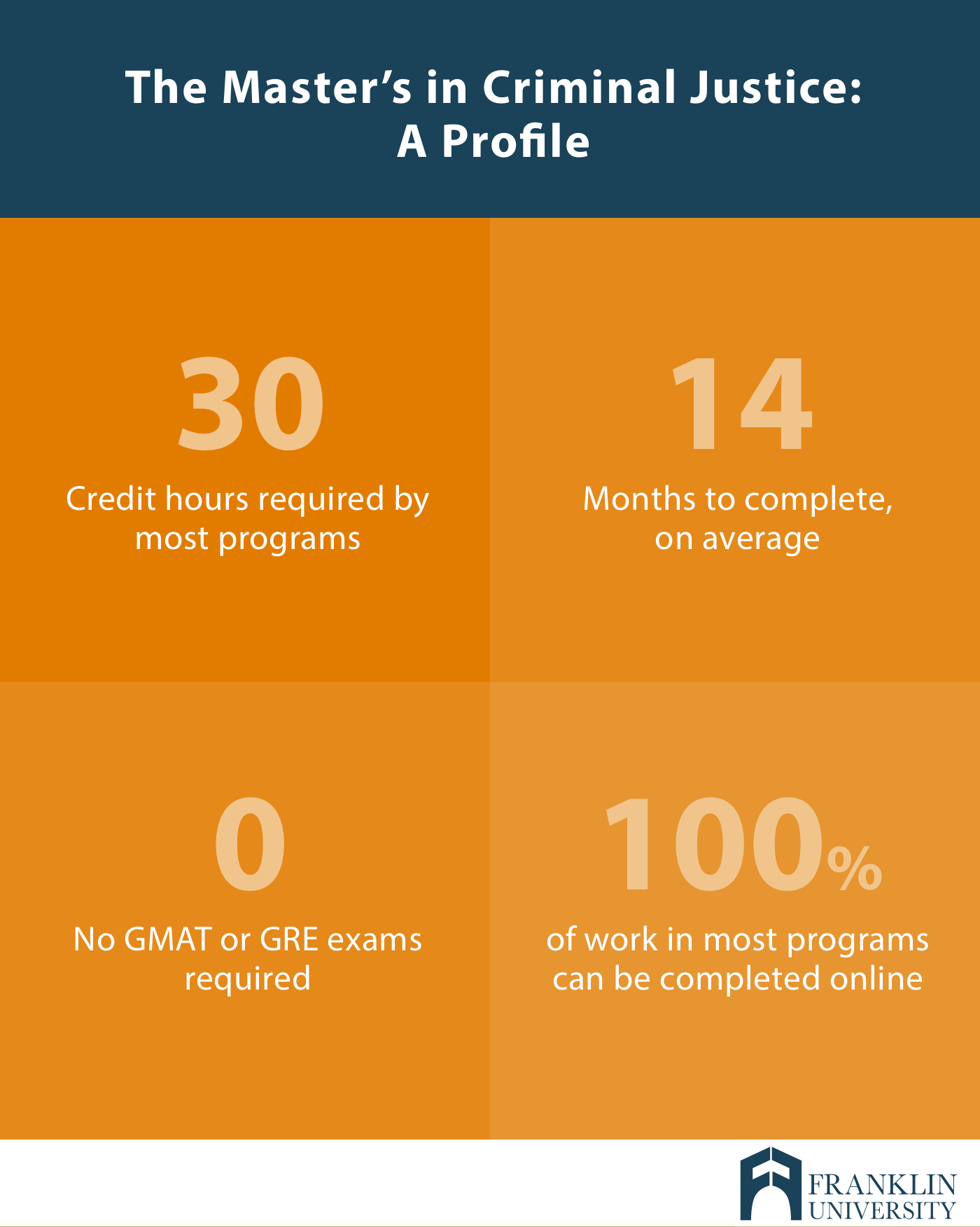Request Information
We're Sorry
There was an unexpected error with the form (your web browser was unable to retrieve some required data from our servers). This kind of error may occur if you have temporarily lost your internet connection. If you're able to verify that your internet connection is stable and the error persists, the Franklin University Help Desk is available to assist you at helpdesk@franklin.edu, 614.947.6682 (local), or 1.866.435.7006 (toll free).
Just a moment while we process your submission.

Everything You Need To Know About a Master's Degree in Criminal Justice
Master’s programs in criminal justice aren't just available, they are growing in popularity.
"As our communities and justice system face substantially evolving threats and issues, a new level of professionals must be ready to man the front lines.
An advanced degree can be very meaningful,” according to Chenelle Jones, Ph.D., Lead Faculty at Franklin University for the Criminal Justice Administration, Public Safety and Emergency Management, and Homeland Security programs. “Having that master’s degree exposes you to critical thinking, research, and best-practice policy that you wouldn’t necessarily see outside of an advanced degree program.”
For a thriving justice system, continuing education is a necessary component in building not just competency but mastery of a challenging, ever-changing environment. Here’s how.

What Will I Learn in a MCJ Program?
As you work your way toward a master’s in criminal justice administration, you’ll address a variety of subjects. As with any master’s program, the focus will include management, policy development, research, and other key topics for people who will become leaders in their respective criminal justice specializations.
While courses may vary by program and specialization, you can expect to see the following types of content in your coursework.
Learn Skills to Research and Understand Criminal Actions
Many programs will include content around Criminal Justice Research & Theory. This often includes courses in criminology, victimology, and research methods.
To effectively combat or prevent crime, we need to understand it. And to understand it, we must study it. So an MCJ program will provide you with opportunities to study biological, psychological, and sociological theories of criminal behavior--as well as theories of victimization, ways to reduce risk of victimization, and service to crime victims.
In order to review and interpret research on criminal justice, students will also learn about research itself and methods they can use in their own pursuits. These research methods include both quantitative (learning through statistics) and qualitative (learning through narratives and through ethnographics and demographics) methods. Quantitative research explains when, where, and how often crimes or criminal behavior happen, and qualitative research looks at why and how it happens. It enables us to more clearly see opportunities to prevent criminal actions or decrease the elements that contribute to it.
Discover How to Lead Effectively
Coursework will also cover areas of Criminal Justice Leadership & Management. A graduating student should have the critical thinking and administrative skills to go beyond just watching over a staff and toward being a powerfully effective leader. Students must learn to think strategically about leading their department or organization. In the criminal justice world, many offices must operate in a competitive political environment where collaboration is required to advance the organizational mission. As one element of leadership, some schools may have coursework in communication. In criminal justice, effective leaders must be able to meaningfully communicate with a variety of people and a diverse population.
Find Out Ways to Fund Justice Programs
Classes on the topic of Program Planning and Funding can also be valuable for you. A master’s program should ensure a graduate has the skills to be the strongest leader possible, according to Dr. Jones at Franklin University. “As an example, we have a grant writing course that explains the challenging process of funding and developing a program in the criminal justice system.” Being the best manager involves finding key resources and funding to promote procedural or systemic improvements. It’s this kind of thinking that enables a person to deliver far above and beyond what’s expected.
When it comes to paying for school, grants are among your best options. But do you know how to find them? Remove the guesswork by downloading this free guide.
Understand How Justice Is Administered
Course content about Administration of Justice will be a major focus. You will need to explore the structures, practices, and performance of organizations in the administration of justice. There is the court system, law enforcement, and corrections, both not-for-profit and for-profit. Learning about and fixing organizational problems in school--before you’re faced with them in real life--can be very useful. You’ll also learn about program planning, implementation, and evaluation.
Advanced Policing & Crime Control
Advanced Policing & Crime Control is another critical area for your MCJ degree. Learning about current policing is only one part of criminal justice; it’s also necessary to discover how to develop, test, implement, and evaluate policing strategies. We live in a world that is changing, one that is complicated both by political dynamics and the need to deliver results when past strategies are not working. To succeed, a master’s graduate can use what they learned in school about framing policy issues, identifying key players in the policy process, and creating the actual policy. As a first step, you may want to visit school sites to consider the coursework you may take.
Requirements & Format for a Criminal Justice Master’s Degree
As you explore different master’s programs, keep in mind that you’ll need to meet some minimum requirements before you apply. You’ll also need to decide what kind of learning format you prefer for your coursework: traditional in-class, all online courses, or a hybrid of the two.
Requirements
- Most often, a bachelor’s degree is required with transcript from accredited school
- A typical academic requirement might be a 2.75 GPA (out of 4.0) or maybe taking the GRE (Graduate Record Exam)
- In some programs, formal police training or police academy may be considered in your application
- Some programs may require an essay or resume as part of the application process
- Timing: Some programs may take around 2 years, and some can be completed in as little as 14 months
- Cost: According to study.com, criminal justice master's programs typically require around 33 to 36 credit hours, although some programs like Franklin University are only 30 hours. A typical cost per credit hour is around $500-650, and you may notice a price difference for schools that are not-for-profit. Here’s an article that can guide you on the cost-effectiveness of a master’s degree.
TIP: Some schools, such as Franklin University, offer tuition discounts through employer partnerships. So, if you’re currently employed, talk with your Human Resources department to see if they offer a tuition reimbursement program or employer partnership tuition discount. You never know unless you ask!

In-person or Online Format
For master’s in criminal justice administration, you’ll find that all types of programs are available: traditional, online, and hybrid. Consider how you best react to learning; you’ll probably know in your gut what format best suits you. Also, before you commit to a 100% online program, there’s something you should learn from the school. Ask what kind of support is available beyond your online coursework. Some schools don’t have much help to offer. “The Franklin University master’s program is 100% online, but that doesn’t mean you’re on your own 100%,” according to Dr. Jones. “There’s personal support throughout the system to help students. The goal is to make sure you don’t just survive the coursework, but you thrive.”
Key Questions to Ask of a CJM Program
As you do your homework about which master’s program works best for you, here are 5 key questions to ask of each school:
1. What accreditation do you hold? If a school is not accredited, the degree may not be worth much to employers. “Degree mills” is the derogatory name often given to unaccredited schools, which are more focused on making money rather than giving students the best education. Stick with accredited schools, which have the proper content and coursework. Sometimes, a degree mill will say it is accredited, when the accreditor is actually made up or meaningless. What you should look for is either a national accreditation from Council for Higher Education Accreditation (CHEA) or from one of six regional accreditors:
- Higher Learning Commission (HLC)
- New England Association of Schools and Colleges
- Southern Association of Colleges and Schools
- Western Association of Schools and Colleges
- Northwest Commission on Colleges and Universities
- Middle States Commission on Higher Education
2. Here’s a U.S. Department of Education site where you can check if a school is properly accredited.
3. Who designs the curriculum? Courses should be designed by seasoned professionals in the criminal justice field. You should feel good if you hear that courses are being instructed by police chiefs, wardens, or corrections officers.
4. How frequently is your curriculum updated to reflect emerging trends and threats? Some programs generate more profit for themselves by not updating their curriculum very frequently. In a field like criminal justice, a program should be nimble and frequently changing to reflect an industry in constant flux.
5. How do you support students in their journey to achieve the degree? You’ll want to hear information about tutoring (and whether it’s free or paid), about accessibility to professors, about networking, and about faculty or offices that are dedicated to student support.
6. What tuition assistance programs do you offer? When considering the total cost of your master’s degree program, consider both a) the number of credit hours required to earn the degree and b) whether the school has opportunities for you to earn credit hours based on previous criminal justice employment or coursework. One school that initially looks more expensive may actually be more affordable than you think.
Bonus: 4 Things to Remember When Pursuing a Master’s in Criminal Justice
Critical Thinking Skills Are Key
Prepare to study differently than you did in your undergraduate studies. Your efforts will be less about memorizing facts and more about understanding concepts, providing your own analysis, and building your critical thinking skills.
There Will Be A Lot of Writing
Your ability to process information means little if you are unable to express yourself well. So, just know that your writing skills will be tested. Ask your short list of schools if they have resources to help with writing and with developing great writing habits.
Tip: If writing isn’t your strong suit (yet), don’t let that get in your way. You can always hire a freelance editor on Upwork.com as an affordable way to help hone your words.
You’ll Need a Support System
A master’s degree is a massive undertaking; it’s an effort that will change your life. Before you begin working on your degree, you’ll need to let family members know what you’re about to do, and how much of your time it will take. Be ready to shift priorities to your degree and know that you’ll probably need to carve out a lot of time so you can make the most of your coursework.
It’s Worth the Investment
The work, the tuition, the time. It’s a lot. But if it’s all worth it in the end, then you can consider it a good investment. And remember, it’s not just an investment in your earning potential; it’s a way to invest in your career, your future, and yourself.





